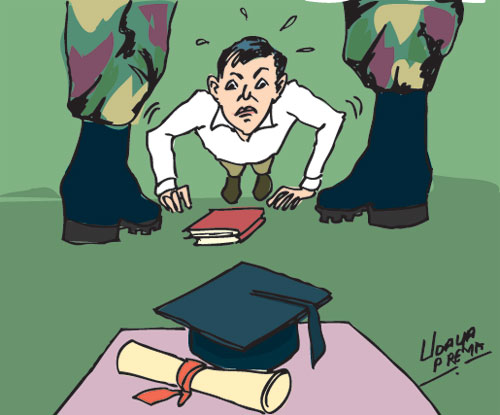At the conclusion of the visit to Delhi this week by Sri Lanka’s External Affairs Minister G. L. Peiris, the two governments issued a joint statement which set out a range of bilateral policy.
However, no sooner had Peiris returned to Colombo, Sri Lankan officials were backpedaling from any commitments he may have given.
“Only discussions were held and no agreements signed though there are reports to the contrary,” the Daily Mirror quoted officials as saying in its front page story.
Interestingly, although Peiris’ visit to Delhi was widely understood to be about the recently released UN experts’ panel report on war crimes in Sri Lanka’s war, the joint statement makes no mention of it.
Peiris is now to go to China. The ‘primary reason’ for his visit, the Daily Mirror said, is secure support from China - described as "Sri Lanka's powerful ally" against the consequences of the UN report.
Notably, Peiris was the UNP’s chief negotiator during the Norwegian-brokered talks with the LTTE. The central agreement of those talks was the 2002 decision to explore federalism as a solution to Sri Lanka’s ethnic crisis.
At the time Peiris was, along with the LTTE’s chief negotiator and political strategist, Anton Balasingham, hailed by the international community as a key peacemaking figures.
However, after he defected in 2005 from the UNP and joined the Sinhala hardline regime of President Mahinda Rajapaksa, Peiris wholesale rejected the idea of federalism. (See the Morning Leader's report here)
In 2007 Peiris explained his rejection of a political solution with a peculiar logic, especially given that he is a professor of constitutional law.
Notions like ‘federalism,’ ‘unitary’ and ‘united state,’ he told a press conference, were "mere words."
He also dismissed the Oslo declaration on federalism as "brandishing words" whose meanings were vague and undefined.
"Today the intellectuals and experts worldwide agree that terms such as federalism, unitary and united have no clear definition and are indistinct at best," he declared.
Instead, what was required, he added as Colombo escalated the massive offensive which concluded in 2009 with the slaughter of 40,000 Tamil civilians documented in the UN report, was a "practical solution" to Sri Lanka's conflict.


